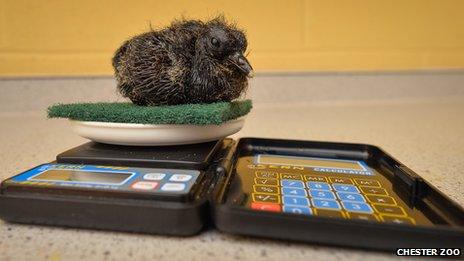Chester Zoo use scouring pads help rear rare chicks
- Published

Two rare chicks are being hand-reared by keepers at Chester Zoo - with the help of scouring pads.
The white-naped pheasant pigeons named Kola and Wokam were rejected by their parents so the zoo has been using the bristly pads to help them thrive.
Keeper Gareth Evans said the pads stop them slipping away and help their feet and legs develop, as they mimic a nest.
The exotic birds were named after two of the Aru Islands in Indonesia, where the species is found.
Mr Evans said: "Hand-feeding them is a tricky business but we use a scouring pad to make things a little easier.
"It gives them something to grip on to to make sure they don't slip and slide around, helping their feet and legs to develop properly."
"Normally they'd be on a nest on the ground made up of lots of little sticks and twigs so a scouring pad acts to create the grip they'd get from the nest," he added.
Chester Zoo said the birds are only found on the Aru Islands and have been reclassified as being vulnerable to extinction by the International Union for the Conservation of Nature.
The chicks are less than a month old and are fed regularly from 06:00 BST to 22:00.
Mr Evans added: "Adult pheasant pigeons produce a unique crop milk which they regurgitate to feed to their young.
"So when we have to hand-rear we have to try and replicate that using a set of special ingredients, featuring egg, water and vitamin pellets."
- Published7 September 2013
- Published6 July 2013
- Published1 May 2013
- Published28 October 2012